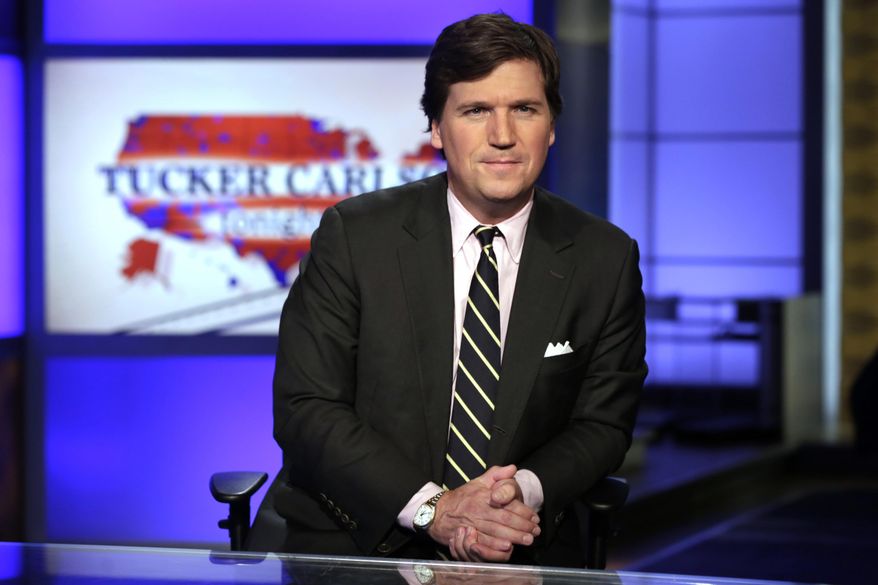Fox News host and Trump cheerleader Tucker Carlson is a culturally conservative, big-government, nationalist populist. As such, he’s upset that establishment politicians and their sponsoring elite don’t care enough to promote his and his fellow Americans’ happiness. (See his recent commentary.)
That’s weird. Why would he want them to?
Timothy Sandefur has exposed Carlson’s failure to grasp that individual freedom and its spontaneously emergent arena for peaceful voluntary exchange — the marketplace — make possible what Carlson insists he values most: “Dignity. Purpose. Self-control. Independence,” which Carlson correctly identifies as “ingredients in being happy.” In his view, those who oppose government interference with markets, that is, with our freedom to engage in mutually beneficial trade, prefer material things to higher goods like family and “deep relationships with other people.” That’s ridiculous: freedom is a higher good, and it underlies other higher goods.
But that’s not all that Carlson fails to grasp. Among other things, he misses the distinction between the libertarian’s appreciation (not “worship”) of markets and corporatism, or anti-market government support for favored business interests, such as tariffs and direct subsidies. He also engages in what I call the dark art of the package deal by assuming that America’s global empire and free markets are integral to a single rational political doctrine. On the contrary, war, big military budgets, and deficit spending make markets less free.
Let’s look at Carlson’s major complaint: that America’s so-called leaders (Trump excepted, I suppose) don’t love us. He spends a good deal of time whining about this. Rather than demand that our (mis)leaders get out of our way and leave the pursuit of happiness to us through private consensual interaction, Carlson calls on the politicians to care for us and even to make us happy. Why he doesn’t find that prospect disgusting is beyond understanding. Politicians could only do what Carlson asks by deciding what ought to make us happy and by forcing us to obey them. Thanks, Tucker, but no thanks.
“They [“members of our educated upper-middle-classes” whom most politicians represent] don’t care how you live, as long as the bills are paid and the markets function,” Carlson writes. Really? Then why does the elite-controlled government prohibit all kinds of peaceful conduct? For example, why does it impose behavior-distorting taxes, tariffs, occupational licensing, land-use restrictions, and intellectual-property rules, all of which impede economic mobility and harm families? Carlson disparages the private pursuit of wealth as detrimental to the pursuit of cultural values, but he ignores that prosperity can relieve the pressures that obstruct the cultivation of those values. He believes that marriage and family are paramount, but the burdens of government interference with private economic activity can take a toll on those institutions.
When Carlson disparages private decisionmaking in the marketplace, he shows himself to be in bed with the ruling elite. Contrary to his position, “market forces” don’t “crush” families; the government does. America’s problem is not an exaggerated desire for iPhones and “plastic garbage from China.” It’s political power.
In recent years the oppression of people who engage in victimless acts has diminished in some ways, for example, through the legalization of marijuana in some states. For Carlson, however, this is bad: “Why are our leaders pushing [marijuana] on us? You know the reason. Because they don’t care about us.” Carlson forgets that regular people have voted for legalization. But in his view, removing a restriction on liberty is equivalent to promoting what he regards as a vice. Freedom be damned. Remember, this is the same guy who claims to value dignity, purpose, self-control, independence, and family. He sees little relationship between those things and freedom, and anyone who does understand the relationship is impugned as a shallow materialist who cares little for his fellow human beings.
“The goal for America,” Carlson says, “is both simpler and more elusive than mere prosperity. It’s happiness…. But our leaders don’t care.”
Note the two problems here. First, “America” as a collective entity should not have goals. Goals are for free people to set, individually and within families and voluntary communities, according to their own values. Second, looking to “leaders” to promote our happiness means trusting rulers over free persons.
Carlson is an elitist in populist clothing.
TGIF — The Goal Is Freedom — appears Fridays.








